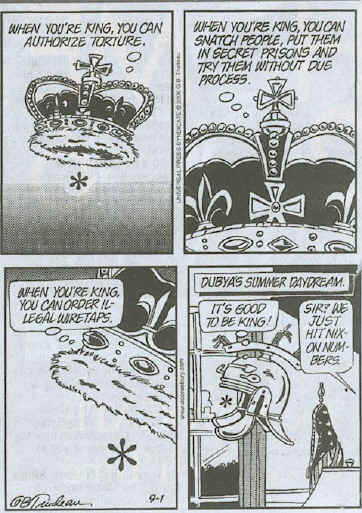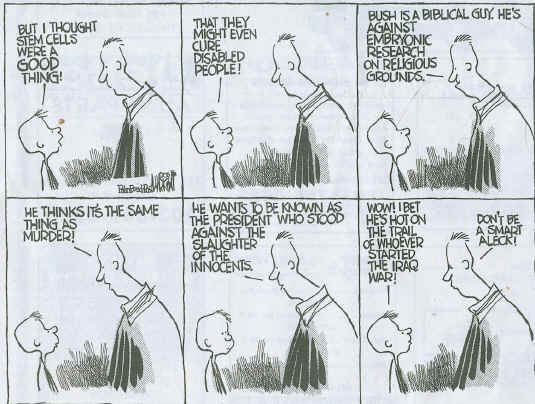Editor’s Note:
There’s been a lot of
talk lately about Bill Clinton’s efforts to “polish his legacy.”
Clearly, he’ll be remembered for Monica, but I think we’ll also recall that the
1990s were a time of peace and prosperity — the calm before the storm.
Although he doesn’t deserve all of credit for that, someday we’ll probably look back nostalgically at the Clinton Era as the “good
old days.” That got me thinking about how we’ll view some of the
conservative administrations once we’re a bit more distanced from them. One
of my more-extreme right-wing friends refers to President Reagan as “a titan.” I wonder
how that will hold up 50 years from now.
The
Lessons of History: How We Got Where We Are
 |
|
Many Democrats and independents consider George W. Bush
the worst president of their lifetime. Based on the past six years, they
could be right, but, with his administration still a work-in-progress,
such judgments may be premature.
Mr. Bush has transformed vast surpluses
into record deficits, bequeathing crushing debt to future generations.
He’s also cherry-picked bad intelligence to start a war he’s bungled
so badly that it now appears endless. And he’s gambling hundreds of
billions of borrowed dollars on a “bait-and-switch” in the Gulf
that’s exacerbating an already-dangerous situation.
Besides dissipating the international solidarity
generated after 9/11, the Iraq fiasco has prevented Mr. Bush from
pacifying Afghanistan — his one major foreign-policy success. With a
reconstituted Taliban, and Osama bin Laden releasing more recordings than
Kelly Clarkson, the president’s pledge to get the men responsible for
9/11 now seems pathetic. |
Excluding Libya, Mr. Bush has had little success
limiting nuclear proliferation. Calling three nations an “Axis of Evil,”
then invading the one without a nuclear program will teach future despots (like
those in Iran and North Korea) to seek America’s respect by developing nuclear
arsenals of their own.
|
Always beholden to the oil industry, Mr. Bush’s energy
policies ignore alternative fuels, conservation and anything that
addresses energy independence or global warming. Always beholden to the
anti-scientific Luddites of fundamentalist Christianity, he’s vetoed
funding for stem-cell research and tacitly supports teaching creationism
in the public schools.
The immigration crisis remains unresolved, and Americans
remain hopelessly polarized. Our president may be “the decider,” but
he’s no “uniter.” |
|
 |
This is written from a moderate-left perspective, so
right-wingers will doubtless disagree with most of it. Conservatives who
aren’t diehard Clinton-haters usually consider Jimmie Carter the worst
president of their lifetime, but the policies engendered during his admittedly
ineffectual administration aren’t threatening America’s future.
Most conservatives believe the greatest president of
their lifetime ¾
and some suggest, the entire 20th century ¾
was Ronald Reagan. (These are the people who campaigned to replace Roosevelt’s
head on the dime with Reagan’s.) Unlike the Bush regime, the Reagan
administration is far enough in the past to permit some perspective.
Republicans talk endlessly about how, “The Gipper got
us standing tall again.” But isn’t that really more talk than walk? For
example, conservatives belittled Bill Clinton for responding to terrorism by
launching a few cruise missiles, but Reagan’s response to terrorism was
offering to trade them a few missiles.
Reagan did invade Grenada, an island less than a tenth the size
of Rhode Island, and he did send the Marines into Lebanon, where Hezbollah blew
up 241 of them. Many of the pundits who castigated Clinton in 1993 for getting
troops killed in Somalia give Mr. Reagan a pass for the far-worse massacre in
1983. (At least Reagan took responsibility for his debacle, which is unheard of
in the Bush-Cheney era.)
Conservatives revere Reagan for winning the Cold War.
However, crediting him with single-handedly shredding the Iron Curtain —
because he called the Soviets an “Evil Empire” and outspent them militarily
— disrespects the cold-warrior presidents, from Truman to Carter, who stood
against Communism for decades. It also disregards the importance of Mikhail
Gorbachev: It’s doubtful Russia would be the semi-democracy it is today if
Leonid Brezhnev or Yuri Andropov had been in charge.
Ending the Cold War never brought us the anticipated
“peace dividend,” as the huge, unfunded military buildup that got us
standing tall continues unabated. Cheerleaders for the military-industrial
complex warn of China’s alarming military buildup; however, its defense budget
isn’t even 15% of ours, and Iran’s is approximately 1%. In 2005, the U.S.
spent more on its military than the rest of the world combined, yet with only
140,000 troops pinned down in Iraq, we’re stretched too thin to deal with Iran
or North Korea.
“Reaganomics” financed the recovery from the
“stagflation” of the Carter years with enormous defense spending and reduced
taxes (mainly for the wealthy), creating record deficits. Reagan hypocritically
blamed his deficits on “big-spending Congressional Democrats,” although he
never once sent Congress anything remotely resembling a balanced budget. He
moved us from a tax-and-spend policy to one of borrow and spend, and we’re now
the world’s largest debtor nation, with China holding much of our paper.
The Reagan years taught politicians that deficits
don’t matter. Fiscal responsibility is now a nonstarter for presidential
aspirants, as Walter Mondale learned during the 1984 campaign, when he suggested
a tax increase might be needed. When the elder Bush broke his “no new taxes”
pledge to deal with the tsunami of debt created by his predecessor’s “voodoo
economics,” his budgetary accountability helped torpedo his re-election.
Comfortable with borrow-and-spend economics, his son doesn’t even pretend to
care about fiscal responsibility.
In the interest of accuracy and the historical record,
it might be wise to temper the hyperbolic canonization of Ronald Reagan. And
years from now, someone may want to temper the hyperbolic demonization of Mr.
Bush … but that’s a task too arduous for me.
Click here to return to
the Mark
Drought home page.

